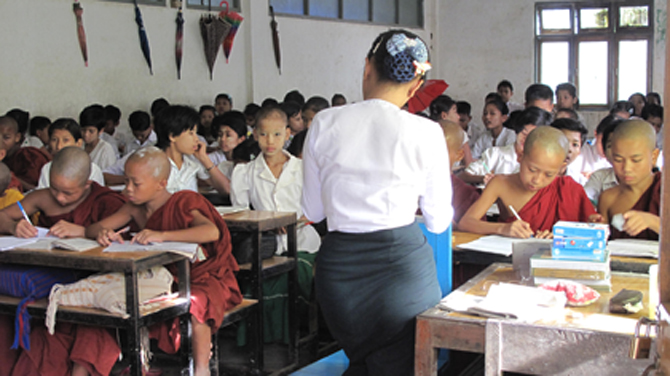Monastic Education the Only Option for Burma’s Poor

RANGOON—Aye Tun makes 70,000 kyat (US $86) per month as a Rangoon public bus driver and his wife makes about 40,000 kyat ($49) per month as a cleaning worker for the Township Public Municipal Department—barely enough to survive, let alone send their three children to school.
“Even though I’m poor, I want my children to be educated. But in my financial position I can’t afford to send all of my three children to the public school,” said Aye Tun, a resident of Hlaing Tharyar Township.
Burma’s 30-Year Long-Term Education Development Plan hasn’t met the needs of the people, although the plan was supposed to implement a system of compulsory and free education for all.
According to parents with school-age children, monthly expenses for a student in the government-run school can range from 10,000—50,000 kyat, with the amount covering fees for school registration, books and stationary, sports, the library and a school fund.
“The school registration fee and contribution to the school fund are one-time payments, but the amount can vary depending on the individual school. Book fees, exam fees and contributions to learning equipment are required to be made on a monthly basis and when needed . We had to buy school desk for our children as well,” said one parent in Pegu.
A Burmese academic who serves as a consultant to the Government Basic Education Department said that because the government has made an insufficient budget allocation to the education sector, parents are forced to cover some needs of the schools.
A professor working for a government educational training institute said that the government’s failure to adequately support the education sector has resulted in a lack of learning equipment, deficient teacher salaries, a financial burden on the students’ families and, most importantly, a large numbers of drop-outs by students from poor families who are unable to afford the fees.
“Between approximately one million and two million children in Burma are unable to study because of their family’s economic hardship,” said Dr. Myo Tint, a retired deputy rector of the Institute of Education.
According to official figures, Burma has 40,900 schools with over 8 million students and 274, 000 registered schoolteachers.
Burma’s Ministry of Education allocates the education budget via its two main departments—the Department of Higher Education, which oversees 64 Colleges, Regional Colleges and Universities, and the Department of Basic Education, which runs more than 40,000 schools. Another 97 Universities, Regional Colleges and Technical Institutes are run under the 12 government ministries.
The Burmese government claimed that it has spent 352,584 million kyat for the education sector, or 4.42 percent of total government spending.
“For a poor family like us, the government-run schools are out of our reach. We have no choice but to take our children to monastic schools where they can receive a free education, free books, free school registration and free donations. So the monastery schools really help families like ours who face economic hardship,” said Ko Aye Tun.
Because of parents like Aye Tun who still want their children to receive an education despite the rising costs of government-run schools, the number of monastic schools in Burma has grown since 2000.
In his paper on “The role of Monastic Schools and Education in Burma,” Myo Tint said that over 200,000 students—or 16 percent of Burma’s school-age children—are studying at over 2,500 monastic schools. The paper said that monastic schools assist in providing important educational needs for poor children and play a significant role in Burma’s education sector.
“We established a monastic school because we were worried that if the children didn’t get an education, they would become street kids or irresponsible adults. We think we should give them a chance to study,” said Sayadaw U Vilarsa, a founding monk of the Pyinnya Shwe Taung Post Primary Monastic School in Southern Zaiganai, Pegu.
He said the school was started with nothing: no funding, no teachers, no desks and no blackboard. Now the school offers a place to study for 250 students from kindergarten to eighth grade, with 11 teachers. Cultural classes are also offered at the school under the guidance of the monks.
“The monastic schools are primarily for those children who can’t attend the government run schools because their families are poor. Here we have no school registration fees. We take care of everything, including books, so many poor families can send their children to us. The number of monastic schools in Pegu is also increasing, as are the number of students,” said U Vilarsa.
1 | 2 next page »
|
||
|
||
|
||
|
||
|
||
|
||
|
||
|
||
|
||
|
||
- 'My Wife Died From Police Abuse,' Says Husband
- US Says Observer Conditions Don't Meet Int'l Standards
- 159 Observers to Monitor Burma Election
- Govt to Address Breaches of SSA-South Ceasefire: Aung Min
- Burma Investors Pin Hopes on Seminal Sunday
- Malaysia PM Leads 50-Strong Delegation to Burma
- US Congress to Assess Burma's Political Prisoner Issue
- Rangoon Woman in Police Station Death Plunge
- Burmese Legal System Remains Tool of Govt: AHRC
- Burmese Army Chief Defends Political Role
